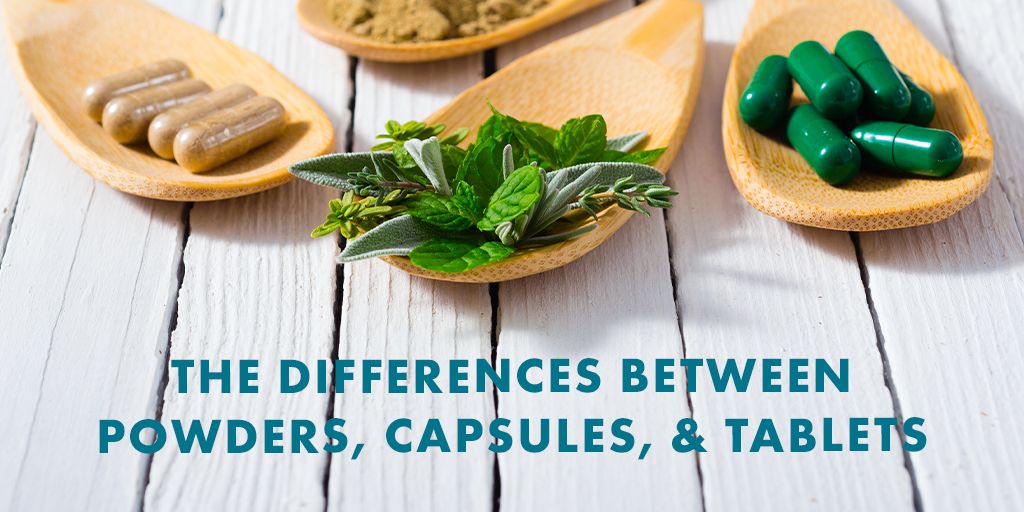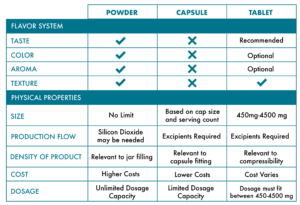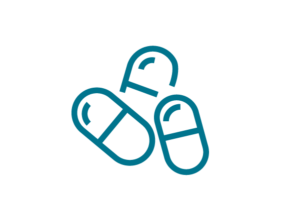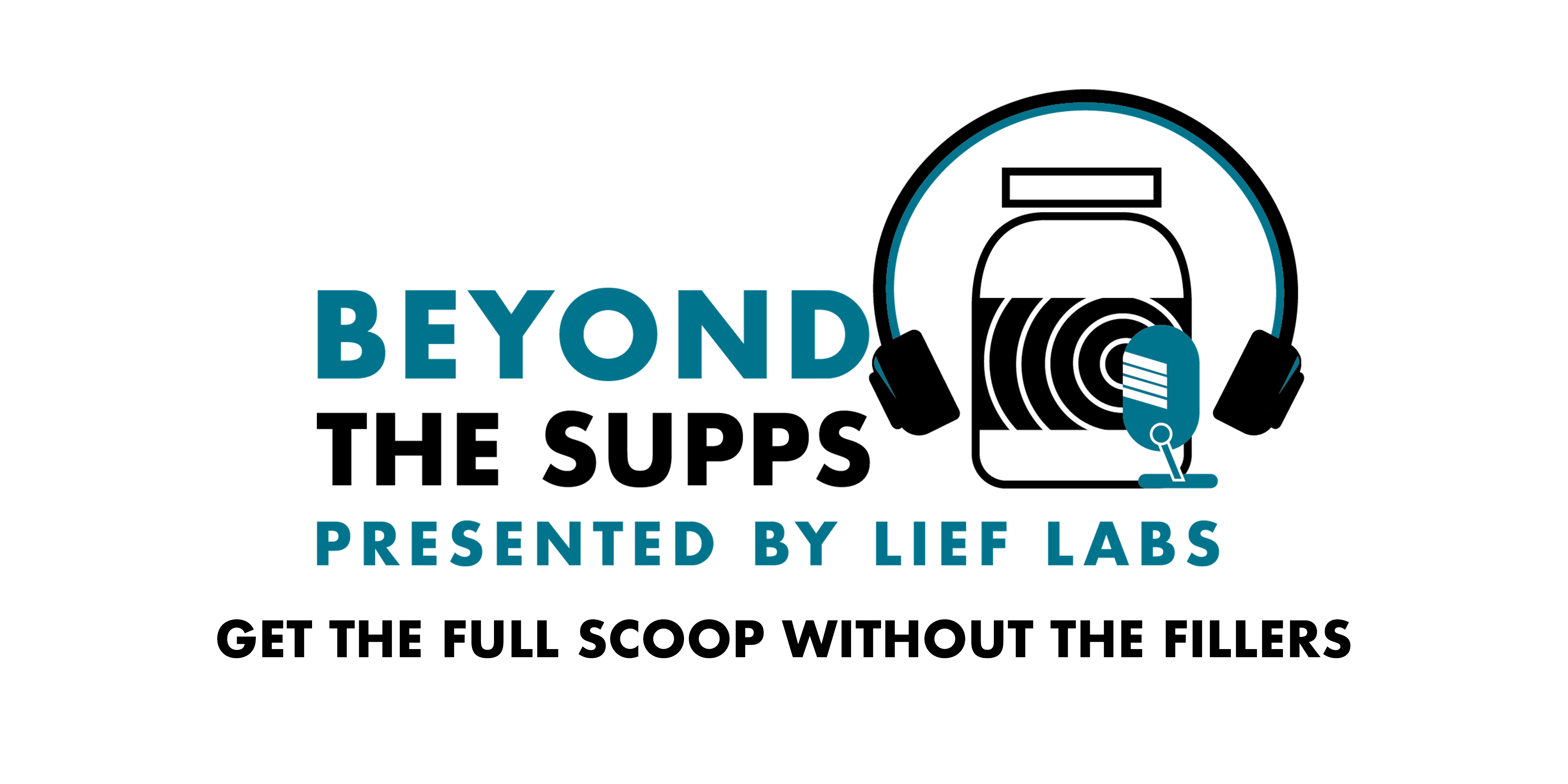
Understanding the Differences Between Powders vs Capsules vs Tablets
Today, there are a variety of supplement forms available in the market, leaving us wondering which dietary supplement application works best.
Each supplement form is manufactured differently, altering its physical properties, nutrient absorption, taste, dosage, and cost. Companies choose each supplement form for a variety of reasons, including consumer preferences, production efficiency, and market trends.
One key factor in this decision-making process is branding. The form of a supplement can significantly influence its brand identity and market positioning.
Do you want to know which form best suits your health goals? Stay connected to learn the difference between various forms and aspects considered during formulation.

As an example, let’s create an “Immunity Mushroom Product” in all three types of applications.
Powders
Powdered supplements are finely ground mixtures of nutrients that can be consumed in large quantities. This supplement form offers versatility and is ideal for patients who struggle to swallow pills or capsules.
When formulation marketable and quality powder, the most important aspects are:
Taste:
- A complex flavor system (sweeteners, maskers, acids, flavors, & gums) is used to mask or cover the “sour, bitter, fishy, or earthy” tasting ingredients in the blend.
- Using our example, to mask the taste of mushrooms, it would be best to flavor the Immunity Mushroom product as either chocolate or orange. These two flavors help cover the earthy taste of mushrooms.
- Using sweeteners and bitter blockers also help to alleviate the bitterness.
Texture:
- Some raw materials are gritty like sandpaper. This is unpleasant on the tongue.
- Gums like xanthan or guar are needed to smooth out the texture of the actives.
Solubility:
- Mushrooms can easily dissolve in either cold or hot water.
Cost (Higher Costs):
- A strong flavor system (sweeteners, maskers, acids, flavors & gums) can cost anywhere between $0.20 – $0.80.
- So, understand that if the active dosages are high, then there needs to be a strong flavor system to cover the taste from the large quantity of actives.
Color:
- Nobody wants to drink a brown “uncolored” mushroom drink.
Color affects our taste preferences significantly. - If this product is an orange flavor, then we need to add color using natural orange & yellow colors like (annatto, beta carotene).
- Without the orange color, psychologically the consumer will not interpret it as orange flavor.
- Avoid adding ingredients like spirulina (which is a “blue-green” color) to this Immunity product, because it will make the product appearance unpleasantly dark bluish-green.
Aroma:
- Just like color, aroma affects our tasting preferences as well.
- For example, Omegas 3 and 6 have a strong fishy odor. So, flavors like lemon or mint are used to mask the smell.
Good Production Flow (Using Excipients):
- The use of free-flowing agents like silicon dioxide may be needed to prevent hydroscopic clumping over time.
Dosages (Unlimited):
- In a powder blend, one has plenty of room to use beneficial & efficacious doses of each raw material.
- Unlike capsules, a powder blend does not have a min or max space capacity.
- But keep in mind, the higher the dosage, the more expensive the product will be.
Capsules
Capsules from nutritional supplements provide precise dosages and are easy to swallow. They are contained within a gelatin or vegetarian shell that protects ingredients from degradation.
When formulating marketable and quality capsules, the most important aspects are:
Serving Size & Total Weight of Blend (Limited Dosages):
- Making sure the total blend fits in the capsule (limited raw material dosage based on capsule size and serving size).
- For example, we might only be able to keep 400-500 mg of the immunity mushrooms in for a 00 capsule with a serving count of two capsules.
Good Production Flow (Using Excipients):
- It is important to use the necessary excipients to create a good quality production with excellent flow properties.
- If the product flow is slow and poor, then the manufacturing cost increases.
- More important without excipients, the product is never consistent.
Density:
- Botanicals are very light and fluffy, which make it difficult to fit the entire amounts into a capsule.
- Referring to size limits, we may only be able to fit 400-500 mg of the mushrooms per 00 capsule, because of their light and fluffy nature.
Cost (Lower Costs):
- Cost is easier to maintain in a capsule because there is limited space.
- Capsule applications do not need to use a “flavor system”, so that lowers cost as well.
Dosages (Limited):
- Because you are capped on the amount of raw materials you can fit into the capsules, this application cannot hold large quantities of each raw material.
- Mainly focus on one “star ingredient” and the other ingredients can be used in much smaller quantities.
Tablets
Tablet supplements are the most common and effective for delivering nutrients. They are made by compressing powdered active substances with excipients, binders, and fillers. The tablets come in various sizes and shapes to provide convenience.
When formulating marketable and quality tablets, the most important aspects are:
Total Weight of Blend:
- The typical range of tablet size is between 450-4500 mg.
Solubility:
- A tablet must be able to disintegrate/ dissolve in less than 30 minutes.
- This mimics the digestion cycle when a tablet is swallowed and brought to the stomach.
Color (Optional):
- Tablets can be colored used coating techniques.
- Currently, the average consumer accepts the natural color of a tablet without the need for a “colored coating”.
- For an Immunity Mushroom tablet, even if the natural color is brown consumers are more accepting of the natural color.
Good Production Flow (Using Excipients):
- It is important to use the necessary excipients to create a good quality production with excellent flow properties.
- If the product flow is slow and poor, then the manufacturing cost increases.
- More important without excipients, the product is never consistent.
Dosages (Varies):
- Since the tablet size ranges from 750-4500 mg, there is plenty of room for either small or large dosages.
Density:
- Botanicals are very light and fluffy, which makes it harder for the tablet to bind and compress.
Taste:
- Taste is important, regardless if the tablet is chewable or swallow.
- It is important that the aftertaste is not medicinal or bitter.
- For example, Orange flavor can still be used in an Immunity Mushroom tablet.
Texture:
- Swallow tablets must be hard.
- Chewable tablets must be softer, but still hard enough to stop the edges from chipping off during transportation.
Cost (Varies):
- Costing for tablets is dependent on many factors:
- Amount of active raw materials
- Whether a tablet-coating is used
- If a flavor system is used
- How much binders and excipients are needed based on the formula
- Overall, tablets require a less complex flavor system compared to powders, so that lowers the cost.
Choosing The Right Form of Dietary Supplement
When it comes to choosing the right nutritional supplement, there is no one-size-fits-all solution. Instead, the choice of supplements depends directly upon your preferences, lifestyle, and health concerns. For instance, powder-form supplements are the right choice if you find it hard to swallow pills. Similarly, opting for a pill supplement is a more convenient option if you are always on the go.
Note: Always consult your doctor before adding a supplement to your diet to address potential deficiencies and prevent medication interaction.
Are you looking for a trusted partner in dietary supplement manufacturing? At Lief, we formulate cutting-edge supplements in powder, capsules, and tablets by complying with the highest quality cGMP (Good Manufacturing Procedures). We understand that the key to creating a great supplement is choosing the application that optimizes and complements the supplement’s formula.
So, choose Lief today to experience seamless manufacturing that aligns perfectly with your branding and production needs.
Frequently Asked Questions
What is the difference between powder and capsules?
Tablets are compressed powders that contain binders, fillers, and excipients, while capsules contain powder or liquid ingredients within a gelatin or vegetarian shell. Similarly, tablets take longer to dissolve as compared to capsules.
Is powder or pill better?
The choice between pills and powders is based on individual preferences, lifestyle, and health concerns. Pills (Tablets and capsules) are easy to carry and offer precise dosing, whereas powders provide versatility.
Which is easier to digest, tablets or capsules?
Generally, capsules are easy to digest as their outer shell gets quickly dissolved in the digestive tract, Releasing the contents for absorption.
Why are capsules cheaper than powder?
The cost is easier to maintain in capsules because there is limited space. In addition, capsule applications do not need to use a “flavor system,” which also lowers cost.
References
Powders & Granules | Pharmlabs. (2023). Unc.edu. https://pharmlabs.unc.edu/labexercises/compounding/powders/#:~:text=In%20compounding%2C%20%E2%80%9Cpowder%E2%80%9D%20refers,different%20amount%20of%20active%20drug
Rudra, N., & Sahoo. (n.d.). PHARMACEUTICAL POWDERS. https://courseware.cutm.ac.in/wp-content/uploads/2020/06/pharmaceutical-powders.pdf
Vandergriendt, C. (2020, February 20). Tablets vs. Capsules: Pros, Cons, and How They Differ. Healthline; Healthline Media. https://www.healthline.com/health/capsule-vs-tablet
Office of Dietary Supplements – Dietary Supplements: What You Need to Know. (2023). Nih.gov. https://ods.od.nih.gov/factsheets/WYNTK-Consumer/
Shah, R. B., Tawakkul, M. A., & Khan, M. A. (2008). Comparative Evaluation of Flow for Pharmaceutical Powders and Granules. AAPS PharmSciTech, 9(1), 250–258. https://doi.org/10.1208/s12249-008-9046-8
Office. (2022). FDA 101: Dietary Supplements. U.S. Food and Drug Administration. https://www.fda.gov/consumers/consumer-updates/fda-101-dietary-supplements
Wellness Through Innovation
It is our mission to provide a seamless customer experience through innovative collaborations, highest-quality products, and unparalleled service. Get started today with a free quote.
Wellness Through Innovation
It is our mission to provide a seamless customer experience through innovative collaborations, highest-quality products, and unparalleled service. Get started today with a free quote.
Wellness Through Innovation
It is our mission to provide a seamless customer experience through innovative collaborations, highest-quality products, and unparalleled service. Get started today with a free quote.
Let's Stay Connected
Contact
-
+1.661.775.2500
-
28903 Avenue Paine
Valencia, CA 91355 USA -
Main Headquarters Hours
Monday - Friday 8AM to 5PM -
Shipping & Receiving Warehouse Hours
Monday - Friday 8AM to 2:30PM
Disclaimer: The information provided by Lief Labs on our website is for general informational purposes only. The information on the website does not constitute legal or other professional advice. All information on Lief Labs’ website is provided in good faith, however we make no representation or warranty of any kind, express or implied, regarding the accuracy, adequacy, validity, reliability, or completeness of any information on our website and/or the links provided. Lief Labs and its parents, subsidiaries, owners, shareholders, and employees are not liable for any damages arising in contract, tort or otherwise from the use of any information on our website. Because your business has its own unique needs, you should consult with legal counsel experienced in FDA, FTC and regulatory matters.
© Copyright 2024 by Lief Organics. All Rights Reserved.




